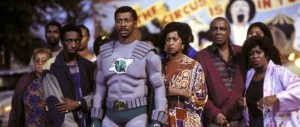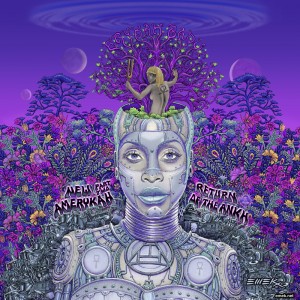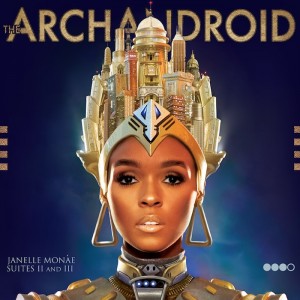What better cultural and theoretical aesthetic to interrogate the interplay of black cultural life in the 90s, the present, and beyond than Afrofuturism? The term refers to a broad aesthetic form that employs technology and various artistic forms (it combines elements of science fiction, fantasy, history, magical realism, and Afrocentrism) to link a historical African past with an imagined black diasporic future.
Attempts by black artists to explore diasporic identity, to reconcile the past with the present, and subsequently envision a future where black is situated as subject, are not new. However, this phenomenon was dubbed “Afrofuturism” in 1994 when Mark Dery, a cultural critic and early writer on techno culture, examined recurring features and themes in African American science fiction, music, and art. In his essay “Black to the Future,” as part of an anthology called Flame Wars: The Discourse of Cyberculture, Dery interviews writers, such as Samuel R. Delany, Greg Tate, and Tricia Rose, in an attempt to explore concerns raised by African Americans writers in the science fiction genre. In the essay, he writes:
Speculative fiction that treats African American themes and addresses African-American concerns in the context of the twentieth-century counterculture–and, more generally, African-American signification that appropriates images of technology and a prosthetically enhanced future–might, for want of a better term, be called ‘Afrofuturism.’
His coinage and definition of Afrofuturism directly relates to science fiction tropes. However, scholars, like Alondra Nelson, Greg Tate, and Tricia Rose (among many others), note that the term encompasses varied art forms and genres, as they relate to black culture and its African retentions.
Important to note is that Dery merely assigned a name to this aesthetic; the form itself has been practiced in black diasporic art for years. There is general sense that the features that comprise an Afrofuturist aesthetic are embedded in black cultural DNA; for they hark in every way to a diasporic identity. In an interview, Alondra Nelson, a social scientist who writes on intersectionality of science, technology, medicine, and inequality, says of the term that it “captured what we’d always known about black culture, but it gave us something to call it, to name it…It gives us a tradition and a legacy, where all the pieces sort of fit together.”

Dery’s article is comprised of commentary from Delany, Tate, and Rose, and these three construct the framework of what we know to be Afrofuturism today. Earlier than that, however, Mark Sinker and Greg Tate were generating conversations about black science fiction and its connection to techno culture and music, among others. In 1992, Sinker published an essay, “Loving the Alien” in The New Inquiry, in which he equates historical slavery with alien abduction as represented in literature. Tate wrote a review of David Toop’s Rap Attack called “Yo! Hermeneutics!”, which highlights a science fiction sensibility in black music. According to Nelson, Afrofuturist art, no matter the medium, is imbued with futuristic themes and capitalizes off technological innovation. In the fall of 1998, then a graduate student at NYU, Alondra Nelson and artist Paul D. Miller established an on-line Afrofuturism listserv, and launched Afrofuturism.net in 2000. Both sites were dedicated to science fictions and discussed how the genre addresses a “past of abduction, displacement and alien-nation” and inspires “technical and creative innovations.” Also, in September of 1999, Nelson organized an Afrofuturism forum at NYU, which dedicated conversation to the “future of black production.”
There is no singular definition of Afrofuturism; the aesthetic is as varied and fluid as the cultural identities it explores. To this day, the aesthetic comprises an array of media forms, including, but not limited to, textual, visual, and aural arts. However, at the heart of this aesthetic form lie some artistic and cultural product that 1. examines the past, 2. critiques the present, and 3. “imagines possible futures.” Many works by Afrofuturist artists, in some way, blend elements of the past with the future to assert opinions on sociopolitical and cultural issues concerning black people. With regards to literature, these opinions usually manifest in the dystopian genre. For example, Octavia Butler’s “The Parable Series” (1993-1998), interrogates notions of racial and gender identity in the 2020s. Her depiction of a futuristic society, depraved and plagued by an exacting, ever-widening gap between the rich and poor easily resembles a not-so-far-distant past, and perhaps even the present. Butler, among other black sci-fi writers, also often re articulated traditional African religion and customs in the futuristic contexts of her novels.
Undoubtedly, an Afrofuturistic aesthetic pervades black culture in the 90s. Primarily the music is informed by futuristic sensibilities. Scholars, like Tricia Rose, pointed out how this manifested in the form of technology and sound reproduction. In an interview with Mark Dery, she says, “Digital music technology—samplers, sequencers, drum machines— are themselves cultural objects, and as such the carry cultural ideas.” Musicians, while utilizing aural mechanisms to revamp sound, also incorporated Afrofuturist themes in a visual and lyrical context. Outkast, for example, definitely falls within this extensive lineage of Afrofuturist artists with the albums ATLiens (1996) and Aquemini (1998). Both albums pushed the bounds of production with extraterrestrial sounds and existential, imaginative lyrics.
Afrofuturist elements can even be found in Erykah Badu’s video for “Didn’t Cha Know” as it alludes to a liminal space where the subject wanders, simultaneously reaching into the past (allusions to Africa, Kimetics, and Egyptology) and looking towards an uncertain, yet hopeful future. This musical lineage extends even further back, however, to artists, such as George Clinton and Sun Ra, and groups like PFunk, who melded their historically informed visions of the future with jazz and funk sounds. More discussion on the emergence of Afrofuturist aesthetics in science fiction and popular music pre-1990s and 21st-century can be found in John Akomfrah’s 1996 documentary “Last Angel of History.”
Undoubtedly, Afrofuturist themes pervade most areas of black culture today, perhaps more so than it ever has. Its prevalence is evident from the music of Janelle Monae and Flying Lotus, to the novels of Nnedi Okorafo and Tananarive Due, to the visual and performing arts of Adejoke Tugbiyele and OluShola A. Cole. That its popularity is growing makes sense, since we are still ironing out methods of reclaiming culture, reinventing tradition, and redefining notions of blackness. The questions posed and pondered, even before the advent of Afrofuturism as a theoretical perspective, still remain: How do black people imagine a better future for black people? What does that future look like? And, how do we get there? —Keith Freeman
_____________________________________________
Works Cited
Dery, Mark. “Black to the Future: Interviews with Samuel R. Delany, Greg Tate, And Tricia Rose.” Flame Wars: The Discourse of Cyberculture . Durham, NC: Duke University Press, 1994. 179-222. Print.
Nelson, Alondra. “Introduction: Future Texts.” Social Text. 20.2 (2002): 1-15. Web. 10 November 2015.
Soho Rep. “Afrofuturism.” Online video clip. YouTube. Youtube, 22 Apr. 2006. Web. 05 November 2015.


Hello there! I could have sworn I’ve been to this site before but after checking through some
of the post I realized it’s new to me. Anyhow, I’m definitely delighted I found it and I’ll be book-marking
and checking back frequently!
whoah this weblog is excellent i like studying your
posts. Stay up the great work! You understand, a lot
of persons are looking around for this information, you can help
them greatly.
Just want to say your article is as astonishing.
The clearness in your post is simply cool and i
can assume you’re an expert on this subject. Well
with your permission let me to grab your RSS feed to
keep up to date with forthcoming post. Thanks a
million and please continue the rewarding work.
Fantastic items from you, man. I’ve take into accout your stuff
previous to and you’re simply extremely wonderful.
I really like what you have received here, really like what you are saying and the way in which by which you
assert it. You make it entertaining and you continue to take care of to stay it wise.
I can’t wait to learn much more from you. This is actually a great website.
excellent put up, very informative. I ponder why the opposite specialists of this sector don’t understand this.
You must proceed your writing. I’m confident, you’ve a great readers’ base already!
This piece of writing will assist the internet people for building
up new website or even a weblog from start to end.
This design is incredible! You obviously know how to keep
a reader entertained. Between your wit and your videos, I was
almost moved to start my own blog (well, almost…HaHa!) Wonderful job.
I really loved what you had to say, and more than that,
how you presented it. Too cool!
Incredible quest there. What occurred after? Good luck!
Pretty! This was an extremely wonderful post. Thank you for
supplying these details.
You really make it seem so easy with your presentation but I find
this matter to be really something which I think I would never understand.
It seems too complex and very broad for me. I’m looking forward for your next post, I will try to get
the hang of it!
I’m not that much of a online reader to be honest but your blogs really nice, keep
it up! I’ll go ahead and bookmark your website to come back
later on. All the best
Hey very nice blog!
Hi there! I could have sworn I’ve been to this website before but after checking through some of
the post I realized it’s new to me. Nonetheless, I’m definitely
delighted I found it and I’ll be book-marking and checking back frequently!
constantly i used to read smaller articles or reviews
that as well clear their motive, and that is
also happening with this post which I am reading at this place.
I don’t even know how I ended up here, but I thought this post was great.
I don’t know who you are but certainly you’re going to a famous blogger if you aren’t
already 😉 Cheers!
Very nice article, exactly what I needed.
Hi there, yup this post is actually good and I have
learned lot of things from it about blogging.
thanks.
Very rapidly this web page will be famous among all blogging and site-building visitors, due to it’s nice content
Great post. I was checking continuously this blog and I am impressed!
Very helpful information particularly the last part 🙂 I care
for such info much. I was looking for this particular info for a very long time.
Thank you and best of luck.
This article is actually a pleasant one it helps new web users,
who are wishing in favor of blogging.
Simply want to say your article is as surprising.
The clarity in your post is just spectacular and i can assume you are an expert on this subject.
Fine with your permission let me to grab your RSS feed to keep up to date with forthcoming post.
Thanks a million and please continue the enjoyable work.
I don’t even know how I ended up here, but I thought this post
was great. I don’t know who you are but definitely you’re going to a famous
blogger if you are not already 😉 Cheers!
This paragraph will help the internet people for building up new weblog or even a weblog from
start to end.
Excellent post however , I was wondering if you could write a litte more
on this topic? I’d be very thankful if you could elaborate a little bit
more. Thank you!
Hmm is anyone else having problems with the images on this
blog loading? I’m trying to determine if its a problem on my end or if it’s the blog.
Any responses would be greatly appreciated.
I’m impressed, I have to admit. Rarely do I encounter a blog
that’s both equally educative and engaging, and let me tell you,
you have hit the nail on the head. The problem is something too
few folks are speaking intelligently about. I am very happy I stumbled across this during
my search for something regarding this.
Do you mind if I quote a few of your articles as long
as I provide credit and sources back to your webpage? My blog is in the very same niche as yours and my
visitors would really benefit from a lot of
the information you provide here. Please let me know if this ok with you.
Regards!
Oh my goodness! Incredible article dude! Many thanks,
However I am encountering troubles with your RSS.
I don’t know the reason why I am unable to join it. Is there anybody having similar
RSS problems? Anyone that knows the solution will you kindly
respond? Thanx!!
Hey there just wanted to give you a brief heads up and let you know a
few of the pictures aren’t loading properly. I’m not sure why but I think
its a linking issue. I’ve tried it in two different web browsers and both show the same outcome.
Excellent, what a weblog it is! This weblog presents useful data to us, keep it up.
Do you mind if I quote a couple of your posts as long as I provide credit and sources back to your blog?
My website is in the very same area of interest as yours and
my visitors would genuinely benefit from a lot of the information you present here.
Please let me know if this alright with you.
Many thanks!
Hi there everyone, it’s my first go to see at this web site, and piece
of writing is really fruitful in favor of me, keep up posting such
content.
Hi to every body, it’s my first pay a quick visit of this blog; this website includes remarkable and genuinely good material for readers.